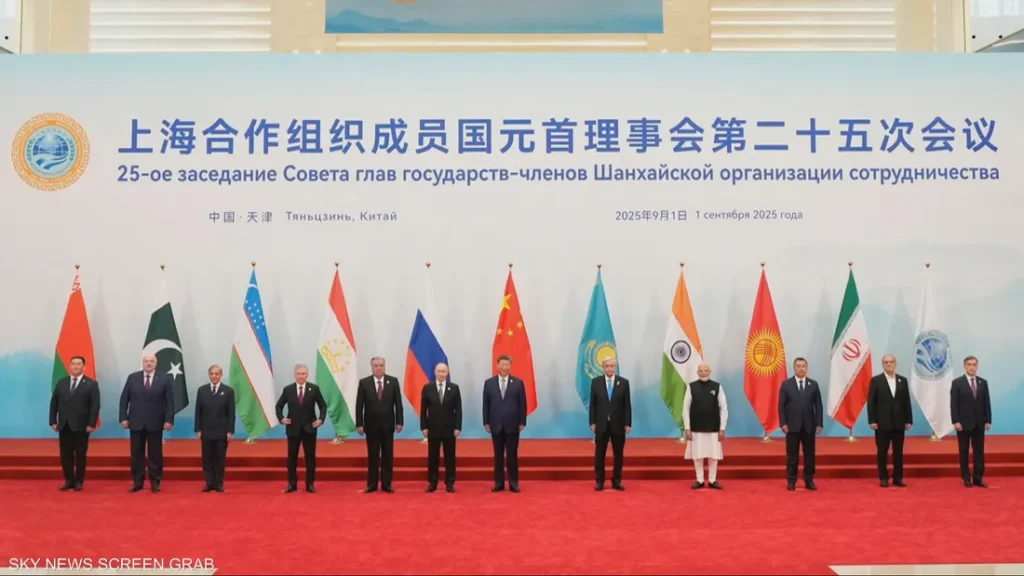As Shanghai Cooperation Organization (SCO) convenes its 25th summit in Tianjin, global attention turns to the tectonic shifts in international relations.
The growing strategic alignment between Russia and China, coupled with calls for a post-Western global framework, signals a potential redefinition of power balances across Eurasia and the Middle East.
A New Cold War? Russia and China Challenge Western Dominance
In a scene reminiscent of Cold War rhetoric, Presidents Vladimir Putin and Xi Jinping delivered pointed messages to the West, accusing the United States and its allies of imposing unilateral agendas on the global stage.
Their speeches underscored a shared vision for a just and multipolar international system, rejecting what they described as Western hegemony.
But the summit was more than symbolic.
It marked a pragmatic step toward building a multipolar framework, sparking widespread debate about its implications for Middle Eastern diplomacy, global economic realignment, and security cooperation.
Shanghai Cooperation Organization as a Platform for Strategic Realignment
Former diplomat Salem Al-Yami emphasized that Shanghai Cooperation Organization has evolved beyond its original economic cooperation mandate to become a robust political and security alliance.
With major powers like China, Russia, India, Iran, and Pakistan at its core, and growing interest from Arab nations such as Saudi Arabia and Egypt, the organization reflects a rising consensus: exclusive reliance on Western institutions is no longer viable.
Al-Yami noted that the SCO’s expansion signals a broader recognition of the need for diversified global partnerships, especially in regions like the Middle East that straddle East-West fault lines.
A Direct Challenge to U.S. Global Influence
Political analyst Mowaffak Harb described Shanghai Cooperation Organization Summit as a strategic declaration by emerging powers unwilling to accept U.S. dominance.
While not advocating a complete rupture with the West, Harb argued that the SCO presents a parallel framework—one that demands equal partnership or risks geopolitical polarization.
This recalibration of alliances is not merely ideological. It reflects a pragmatic response to shifting global dynamics, where countries seek autonomy in shaping their foreign policy and economic futures.
Russia-China Convergence: Shared Interests, Strategic Depth
The growing synergy between Moscow and Beijing is rooted in mutual strategic interests. Russia, isolated by Western sanctions over the Ukraine conflict, finds in China a vital partner.
Meanwhile, China views Russia as a counterweight to U.S. pressure on issues like Taiwan, trade, and technology.
Al-Yami stressed that this is not a tactical alliance but a long-term strategic convergence, aimed at building a resilient bloc capable of attracting partners from Asia, Africa, and the Middle East.
Summit Rhetoric: A Blueprint for Global Governance Reform
Harb highlighted that the speeches by Putin and Xi were explicitly directed at Washington, blaming the West for global instability and pledging to build a system based on justice and pluralism.
These declarations, he argued, are not mere slogans but a strategic roadmap for reshaping global governance.
Middle East: A Key Arena in the Multipolar Equation
The Middle East is emerging as a critical testing ground for Shanghai Cooperation Organization vision.
Al-Yami pointed to Saudi Arabia’s active participation and observer status as evidence of a regional pivot toward diversified alliances.
With strategic assets like energy reserves and maritime corridors, the region is well-positioned to play a central role in the evolving global order.
Western Concerns Over Regional Realignment
Harb noted growing unease in Washington over the Middle East’s warming ties with SCO.
The U.S. fears that losing influence in the region could undermine its global leverage, prompting efforts to counterbalance the SCO’s appeal through diplomatic and economic initiatives.
He added that Middle Eastern nations no longer view the U.S. as their sole strategic partner, increasingly engaging with Moscow and Beijing as viable alternatives.
Economic Dimensions: Gold vs. Dollar Dominance
Al-Yami linked the summit’s outcomes to a broader decline in trust in the U.S. dollar, especially as a tool of sanctions.
He noted that many countries are exploring alternatives, including gold reserves and local currency trade settlements, to reduce dependence on the dollar.
Harb echoed this sentiment, stating that the economic decoupling from the dollar could represent the most significant blow to the Western-led system since World War II.
The Future of Global Power Structures
Al-Yami predicted a prolonged transitional phase, where traditional Western influence intersects with the rise of blocs like SCO and BRICS.
He believes the Middle East will be a central arena in this competition, with nations needing to clearly define their strategic alignments.
Harb concluded that while the U.S. remains a formidable power, it will resist the emergence of a multipolar world through sanctions, military alliances, and diplomatic pressure.
The key question, he said, is whether Washington can sustain the cost of this confrontation.
A World in Flux: The SCO’s Message to the Global South
The 2025 Shanghai Cooperation Organization Summit in Tianjin sent a clear signal: the unipolar era is waning, and a new global equation is taking shape.
As more countries seek to diversify their partnerships, particularly in the Global South, the SCO offers a compelling alternative to Western-centric models.
Al-Yami views this moment as a turning point toward multipolarity, while Harb sees an open-ended contest between rising powers and entrenched Western influence.
What’s certain is that the summit marked a strategic milestone, affirming that global governance is no longer a Western monopoly.
Read also: Somalia Banking Sector: Ambitious Transformation and Risky Challenges








